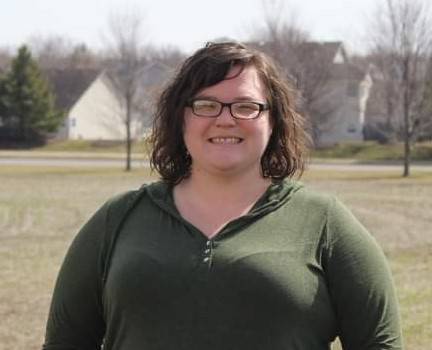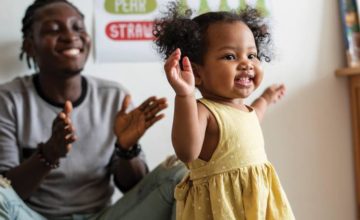featuring ZERO TO THREE Member Tyler Reynolds
COVID-19 hit a lot of different professions hard. It hit a lot of people really hard. From the isolation to the social distancing all the way to losing loved ones, many people were impacted. Home visiting was hit hard. How do we continue to support the families we work with when it is not safe to visit them?
Our program, the Jumpstart Home Visiting Program—Easterseals Joliet Region, closed down on a Thursday. We stopped home visiting 2 days before our state “locked down” to take a break in order to gauge the safety of continuing services in the midst of the data coming out from Johns Hopkins University. Personally, I really struggled with this decision because home visiting supports the most vulnerable children in our community and we were pulling back. I felt like we were betraying our families. We go into homes, become a part of their lives. We are there to experience and support parents through all of their child’s firsts. We might not be in the room when these firsts happen, but we get to support parents through them and encourage the parents to build off of those moments because of the relationships we have built with them. We are also there for the hard and scary times. We walk alongside parents who are having a mental illness crisis, or when their child is placed into care, or through some scary medical diagnoses. These hard and scary times impact the ability to care for a child at their best. We are there to talk through, problem solve, and support. But when COVID-19 entered the scene, we pulled back. We shut down, the world shut down. It was terrifying.
These hard and scary times impact the ability to care for a child at their best. We are there to talk through, problem solve, and support.
As a home visitor, I was experiencing the same fears that so many of the families in our program experience. Would my job still be here? Can I feed my family? What happens if I get sick? Those fears made it difficult to function and think. These are the same fears that so many of the families in our program faced before COVID-19. I was able to lean on my family and friends who provide positive support. I knew that if I lost my job, I had a few places I could go. So many other people cannot say that. When our program shut down that Thursday, I felt all of that and more. My heart ached so deeply for specific families that I work with and the rest in our program and community who desire to have support and encouragement but because of COVID-19 were inundated with fear and uncertainty. I felt that shutting down our program showed that we were abandoning these families. Building a relationship takes time and it has to be based on trust. The families we work with trust us. They share the exciting moments and we celebrate with them! We hear about the hard days and we support them. By pulling back, I felt like it was a betrayal of trust. How can we say that we support families even during their hard times when we close our doors during one of the hardest times?
I called my supervisor that day. I cried and yelled and shared all of my anger and disappointment in what we were doing. She listened to me as I shared my unfiltered thoughts about how this was the ultimate betrayal. My supervisor, like so many others, had lives in her hands and had to make a choice about what to do in that moment. We talked for a long time once I had calmed down and we made a plan. She agreed that we couldn’t stop seeing families, but we needed to do so safely so for the time being, so we would pull back.
My supervisor and I took Friday and the weekend to play around with and get an understanding of Zoom. At first, it sounded easy until I realized that we would still need to be able to do different screenings and assessments as well as being able to share handouts and see the children while also talking to the caregivers. We figured it out! On Monday, we trained all of our home visitors on how to do virtual home visiting, and we shared the little information that was provided to us from our program model and from the state. By Wednesday morning, our first virtual home visits were happening. Home visitors were able to sit with families with very little disruption to the typical flow. We never closed our program and we missed only 3½ days of visits. Looking forward from March, the rest of 2020 seemed to be filled with meetings and webinars on how to implement virtual services. My heart still aches for all of those families who were part of programs that closed and chose to wait for more guidance, missing out on time and services that could have been provided.
My heart still aches for all of those families who were part of programs that closed and chose to wait for more guidance, missing out on time and services that could have been provided.
Jumpstart is a very fortunate and interesting program. We seem to operate differently than most other home visiting programs. We operate under a “why not” mentality. If a pilot project is offered, we join. If there is a new program, we try it. When we have an idea that may seem a little crazy, we jump in head first. “It’s better to ask for forgiveness than permission” has been said many times in regard to crazy things we choose to do. As a program, we choose to act. People in general have three options when faced with anything. You can focus on feelings, thinking, or actions. Hopefully, you can go through all three: Feelings spur thoughts and thoughts turn into action. It is hard to move through feelings when we are scared. COVID-19 was and still is terrifying. We acted quickly, we took a weekend, and then moved forward with continuing services, modified for the safety of everyone involved.
Information and guidance from our program model and state were limited. We took it upon ourselves to design what home visiting looks like for us while in a virtual environment. Now, there is a webinar for everything, but we had to figure it out ourselves because we chose to act quickly and ask for forgiveness later. We designed drive-through groups for our families complete with snacks, art supplies for creative play, and self-care ideas for caregivers. We offered virtual story time starting in March 2020. Our partnership with different local agencies became strengthened as we were able to support each other while still supporting the families in our program through new ways.
Our weekly drive-through groups started in July. We set up at different playground around our service area and we had kits complete with instructions on take-and-make things. Families could stay and play if they chose. We moved to monthly in September when schools were starting virtual learning and caregivers needed to learn how to juggle this new normal. These groups continued through Thanksgiving and we are starting them back up in April! The groups will be vital for some of our families to feel comfortable with seeing us in person. The playground is a low-stakes environment where we can see each other in person, but still stay safe.
Virtual story times started with our home visitors recording themselves reading a book. We aired the first story on March 16, 2020, on our Facebook page. We used this virtual story time to model how caregivers can read to their children. Virtual story time was also used to let the families in our program know that we are still here and we will continue to be here. This worked wonderfully! Our virtual story time has now shifted into a Random Holiday Book Reading Thing! We have caregivers recording themselves reading a book to their children to post on Facebook. World Hijab Day book reading was a hit, and it took off from there! Caregivers are modeling for other caregivers in a way that doesn’t shame or make anyone feel bad. Everyone is able to watch these videos on their own or with their own children. We have book videos sent in for other random days throughout 2021, and this may be something we continue to do year after year.
Community agencies in our area really came together during the early part of COVID-19 lockdown. One major partnership was exponentially strengthened. The Pregnancy Resource Center near us offered a curbside care event where anyone could drive up, fill out a form, and leave with baby items like diapers, wipes, clothes, formula, and other items. We stepped up and became the volunteers running this event. The center, because of COVID-19, didn’t have many volunteers but saw a deep need in the community and wanted to help. Jumpstart families were feeling that deep need, so it just made sense for us to use our existing relationship with them and help them create a successful event. Curbside care became so successful that, 12 months later, it is still running and we were still there to help get needed materials to the families in our program and the families in the community.
Virtual home visits opened up new opportunities for us. We have been able to meet with families at more convenient times for them. A 7:30 am home visit would not have ever been doable before. Now, I can roll out of bed, log on the computer, and meet with a family all before 8:00 am. We can also offer a 7:00 pm-9:00 pm group connection and not have to worry about the building closing or child care when babies are overtired. We can focus on facilitating the group to support caregivers while they tend to the needs of their child. Times that work for both the family and the home visitor can be outside of the traditional timeframe because there are fewer things to have to work around. There are still some challenges that we are working through as they come up, but virtual visits allow home visitors more freedom to better connect with families at more convenient times.
Adapting to new challenges has always been something a home visitor had to do. Every family and every house is different. The relationship that home visitors have with the families they work with are all different. With one family you can be blunt and more direct, with another you may need a little more finesse in how you speak. COVID-19 changed the way we adapt to challenges. It didn’t change that relationships are the foundation of home visiting. We had to think about things differently, and we had to find new ways to engage families and the community. It also allowed us the opportunity to support families in new ways and to stretch what home visiting looks like. Now, home visiting can look like stories on Facebook, Zoom calls, park hops, diaper drives, take-and-make crafts, and pajama pants. The relationships are still there and they still take work to build, but now we have more tools to use. COVID-19 impacted our work, our lives, and our community, but now we know how to keep supporting families and stay safe through it.




